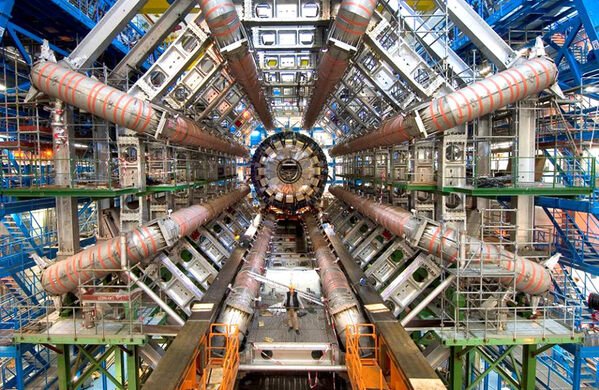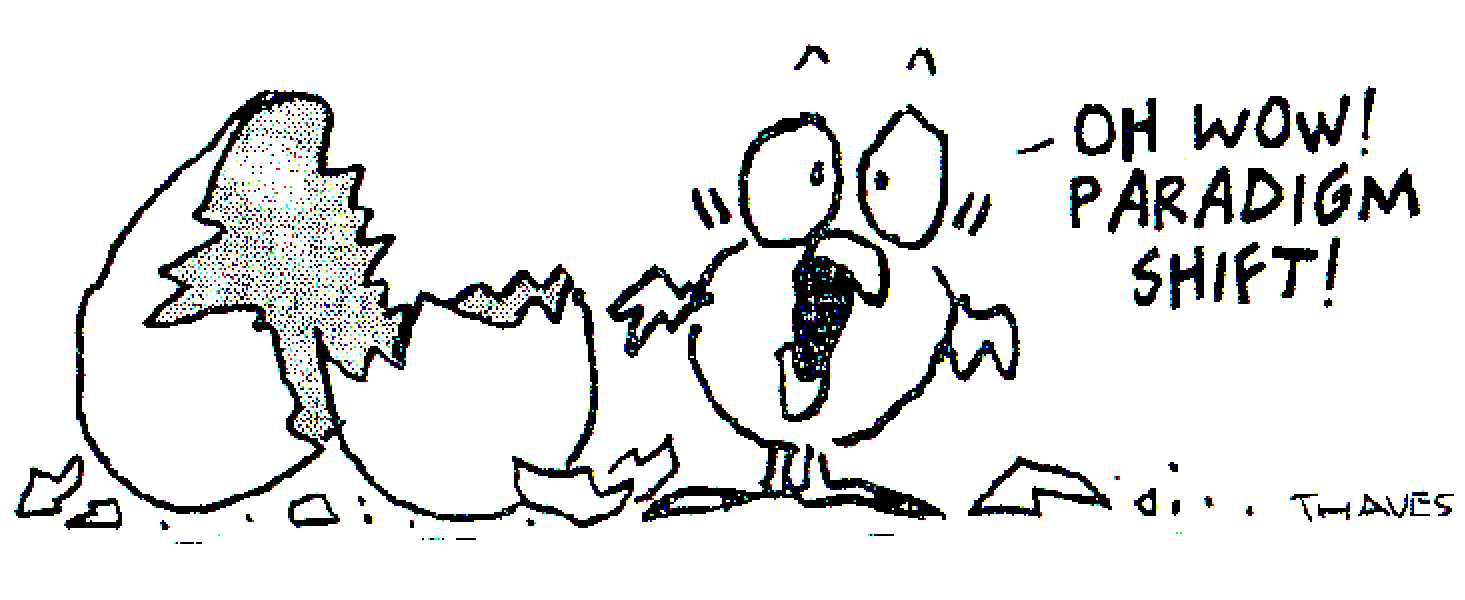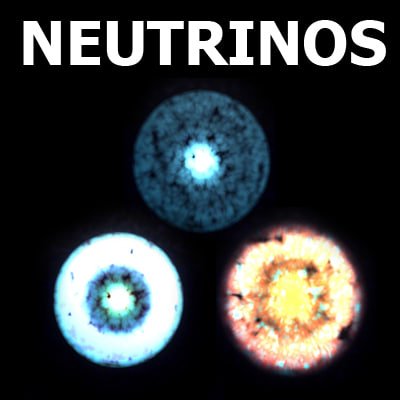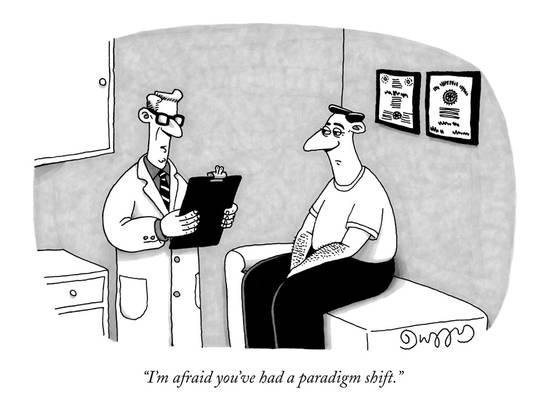The speed of light is a cosmic constant. One of the tiny number of absolute rules of the universe that helps us sleep soundly at night. Nothing can move faster than light. We know that. That we know.

Until scientists at CERN went and done broke it.

A spokesman for CERN, the great particle research center located in Geneva, said that over the course of three years 15,000 beams of neutrinos were fired from CERN base towards the lucky jerkwards working at the Gran Sasso Laboratory in central Italy.


The distance between the labs is roughly 500 miles. Light would have travelled that distance in about 2.4 thousandths of a second. The neutrinos took 60 nanoseconds less (or about 60 billionths of a second) to make the trip.

Neutrinos ain’t got no time for yo’ science bulllllllshit. Let’s get this thing done!

CERN waited a long time to release this finding, waiting to verify, verify again, triple verify, then double-triple verify their super-weird measurements. And then, when they finally did raise their hand and speak up, they asked other particle labs around the world to help proof-read the findings.
Why so cautious? Because what they found isn’t supposed to be possible. If true, matter moving faster than the speed of light is a foundational change to how we understand the way everything works. It’s such a mind-blowing change that scientists don’t even want to speculate on what it would mean for the future of particle physics.
But it’s a big-assed deal whenever Einstein is proven wrong. It happens from time to time (and ever more frequently), but it’s still a big deal.

Now, it should be noted that it wasn’t LIGHT itself that went faster than light. It was neutrinos. Neutrinos are weird. They are sub-atomic particles created in radioactive decay, such as the sun. And they do oddball things. They can pass through most types of matter without detection or affect, including water, air, and rock. Millions pass through us every darn day, and we are none the wiser.

So who knows what neutrinos are up to, but they might have just changed…everything.

 @writesbackwards is a group of friends who love to write about life, sports, comedy, tech and other fun stuff!
@writesbackwards is a group of friends who love to write about life, sports, comedy, tech and other fun stuff!
Consider leaving a comment, we love rewarding engaging Steemians!

This is incorrect actually, not sure where you got this.
OPERA Experiment folks made this declaration in September of 2011, and CERN corrected the mistakes of the experiment by June 2012 after peer-review failed months earlier. It turns out they were using an improperly calibrated clock.
The Speed of Light is secure, and not only that, mathematically there would be massive problems in the logic of algebra (and therefor Physics) if C wasn't the max speed possible. C mostly likely comes from the very quantization of physical values themselves, much like Heisenburg Uncertainty Principle stems from Math not Physical experiment.
Anything that violated the speed of light, would destroy all of logic itself, as 1x + 1x would no longer equal 2x, but could be worth just about anything.
In other words, certain Physical Principles cannot be violated without declaring that the Universe itself is impervious to scientific reason. It didn't take a ton of time for Philosophers to figure out that certain things are ALWAYS predictable, and all of science is based on this.
To believe C can be exceed, is to believe science doesn't exist at all. That's fine if you believe that, but you're probably going to be wrong a lot when trying to plan out your days. Flat Earthers indeed.
Oh, and contrary to popular Physics people, Einstein was never wrong. Even when Einstein himself thought he was wrong, it turned out Einstein was right. For this funny story, read up on the Cosmological Constant Einstein "invented" out of thin air to explain why experimental evidence supported an expanding Universe size.
You're absolutely right!
If c was shown not to be the absolute speed limit of the universe then all of special and general relativity would crumble immediately. Einstein didn't just create a theory - he revolutionized all of physics and therefore our understanding of the universe. General relativity has been rigorously tested and confirmed many times and is used in our daily lives. The most common example is the Global Positioning System (GPS); satelites in orbit have to account for time dilation caused by the Earth's gravity in order to be precise to a few meters (or less). This is something that wouldn't work if speed of light in vacuum wasn't limited to c.
Regarding Einstein's genius, his contributions to science reach even farther than special and general relativity. His work in statistical physics finally established the atomic and molecular theory of the microscopic world (see Brownian motion). He also helped develop the theory of heat and thermodynamics which leads me to one of his favorite quotes: "Classical thermodynamics ... is the only physical theory of universal content which I am convinced ... will never be overthrown. "
Such bold statement still holds its ground since thermodynamics was one of the few theories almost completely unchanged by the rise of modern physics.
didn't know that about his statement on Thermodynamics, great stuff!
Also didn't know GPS used time-dilation, also a great fact to know.
Still believe Einstein was right about "God doesn't play dice" when it comes to quantum interpretation, and we've lately seen very convincing arguments, evidence, and experiments from the Bohm sector of quantum mechanics which do a lot to add credibility to Einstein's statement. This is really the only thing Einstein said which is still challenged, and his last two important papers are STILL as relevant today as they day he published them. ER = EPR if memory serves (the pneumonic for both papers, and also the phrase of a new theory linking the two).
Ulundo, you writing anything on this topic? Would definitely read more of your stuff if you have Physics...
Yes, I plan to write about physics for sure... I thought writing about electrodynamics and relativity among other areas as soon as I can. I'm kinda struggling with exams at the moment :)
lucky you, get the A's, THEN write about Physics then. You must be a physics major or math then?
Where do you study?
Informative post.I have a question that speed of light is greater than speed of sound?
Well.... Yeah... of course.
Very interesting read, I did not realize that there was so much research out there devoted to trying to "beat" the speed of light so to speak. Like you pointed out - it's always a big deal when Einstein is proven wrong, it will be interesting to see what further research this leads to...
it is a kind of another revolution and again a new theory and chapter for students in chemistry and physics but it is great to read it @writesbackwards
Another at standing work from the general him self @writesbackwards, I salute your government oh..